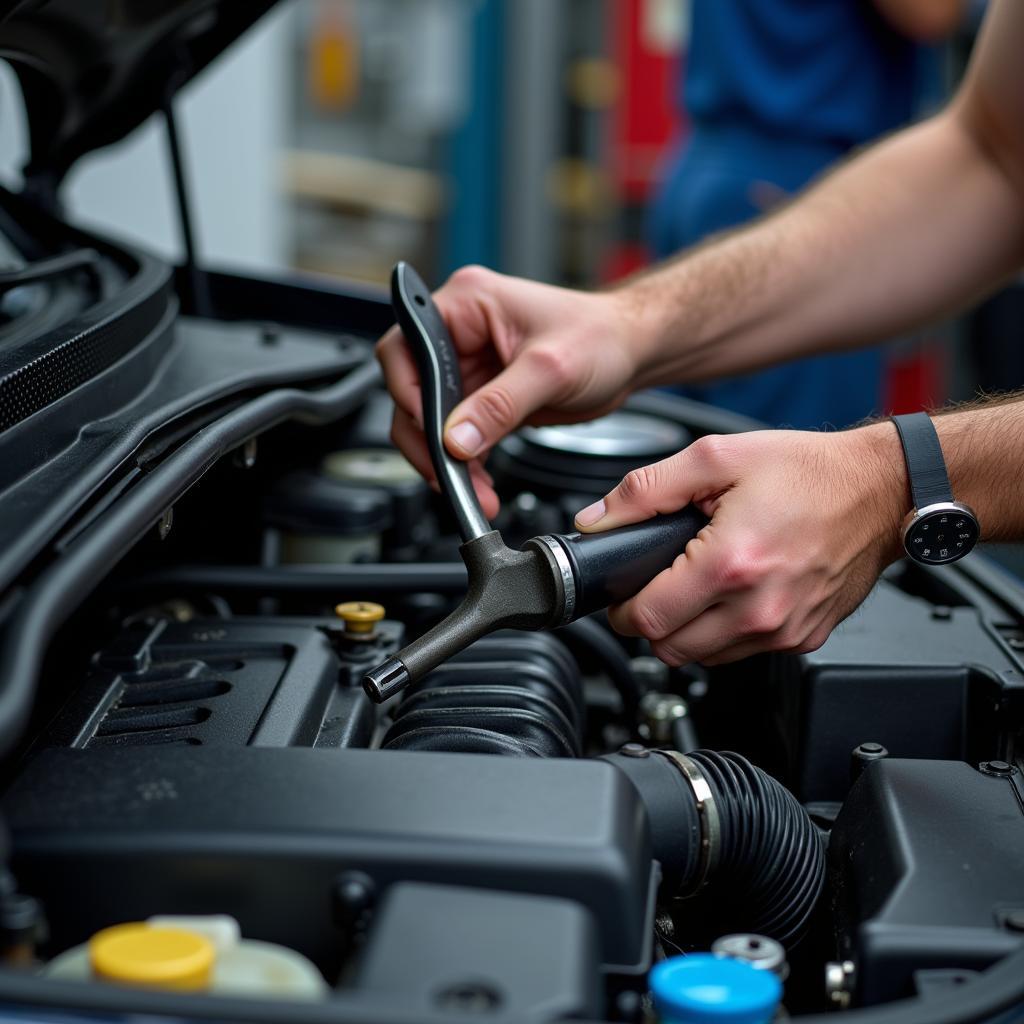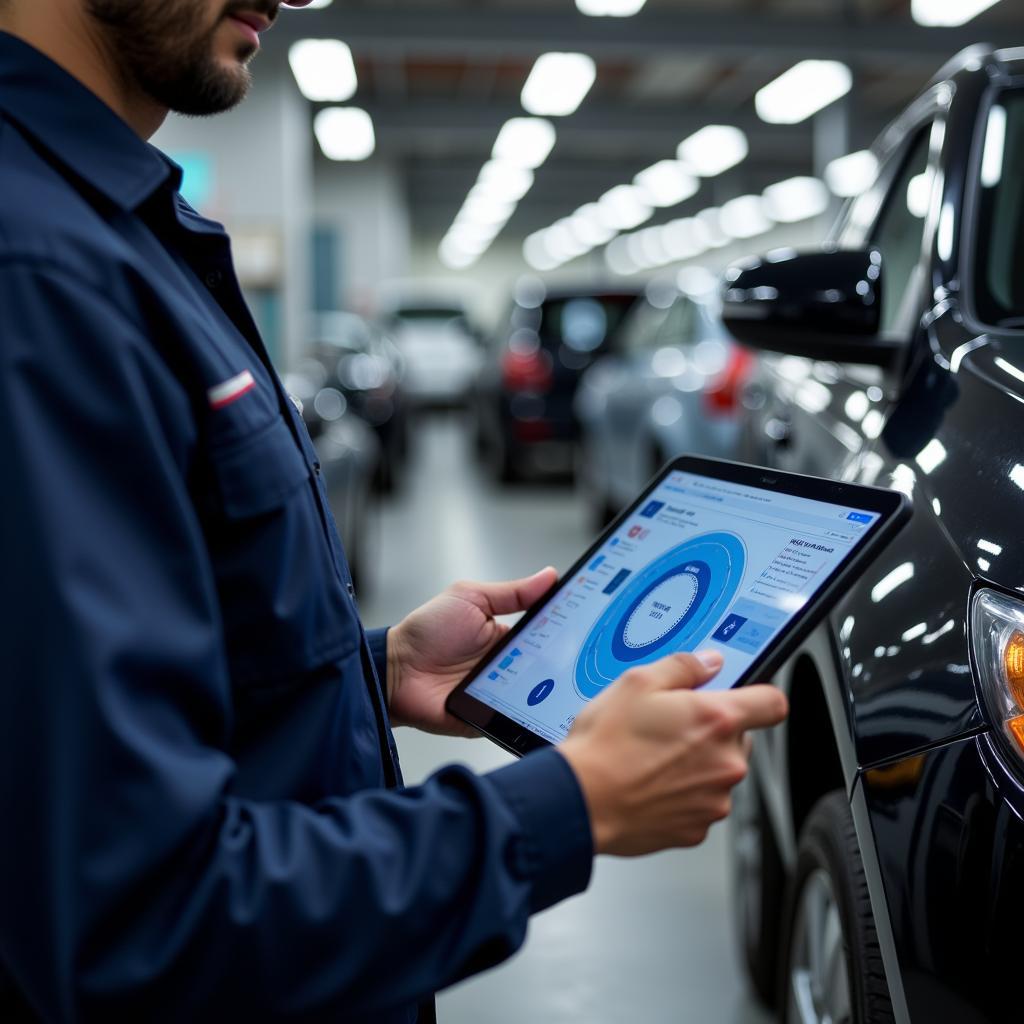What Does “Car Being Serviced” Mean?
Knowing what “Car Being Serviced” entails is crucial for every car owner. It means your vehicle is undergoing essential maintenance or repairs to ensure it runs smoothly and safely. Whether it’s a routine oil change or a complex engine repair, having your car serviced by professionals can save you time, money, and potential headaches down the road.
Understanding Car Servicing
Car servicing encompasses a wide range of procedures carried out by qualified technicians. These services aim to:
- Maintain your car’s performance: Regular servicing keeps your car running at its best, ensuring optimal fuel efficiency, engine power, and handling.
- Enhance safety: Servicing includes checks on critical safety components like brakes, tires, and lights, reducing the risk of accidents.
- Identify potential problems early: Regular inspections can detect minor issues before they escalate into costly repairs.
- Increase your car’s lifespan: Well-maintained cars generally last longer and hold their value better.
 Car Engine Inspection
Car Engine Inspection
Types of Car Services
Car services can be categorized into two main types:
1. Routine Servicing: This covers regular maintenance tasks performed at specific intervals, usually based on mileage or time. Common routine services include:
- Oil and filter change: Essential for engine lubrication and performance.
- Air filter replacement: Ensures clean air flow to the engine for efficient combustion.
- Spark plug replacement: Crucial for ignition and fuel efficiency.
- Brake inspection and service: Ensures optimal braking performance for safety.
- Tire rotation and pressure check: Promotes even tire wear and extends tire life.
- Fluid top-ups: Includes coolant, brake fluid, power steering fluid, etc.
2. Repair Services: These address specific issues that arise with your vehicle and often require more specialized knowledge and tools. Some common car repairs include:
- Engine repairs: Addressing problems with the engine block, cylinders, or other internal components.
- Transmission repairs: Fixing issues with the gearbox, clutch, or other transmission parts.
- Electrical system repairs: Diagnosing and fixing problems with wiring, battery, alternator, or other electrical components.
- Suspension and steering repairs: Addressing issues with shocks, struts, tie rods, and other components that affect handling and ride comfort.
- Exhaust system repairs: Fixing problems with the muffler, catalytic converter, and other exhaust components.
When Does Your Car Need Servicing?
Most car manufacturers provide a recommended service schedule in the owner’s manual. This schedule outlines the specific services required at different mileage or time intervals. However, several factors can influence how often your car needs servicing:
- Driving conditions: Frequent stop-and-go city driving, extreme weather, and rough terrain can put more wear and tear on your car, requiring more frequent servicing.
- Driving style: Aggressive driving habits like hard acceleration and braking can also necessitate more frequent servicing.
- Vehicle age: Older cars generally require more frequent servicing due to wear and tear on components.
Finding a Reliable Car Service Provider
Choosing a reputable and trustworthy car service provider is crucial for a positive experience. Here are some tips to help you find a reliable mechanic:
- Ask for recommendations: Seek recommendations from friends, family, or online communities.
- Check online reviews: Look for reviews and ratings on websites like Yelp, Google Reviews, or specialized automotive forums.
- Look for certifications: ASE-certified technicians have demonstrated knowledge and skills in automotive repair.
- Inquire about warranties: Reputable shops often offer warranties on their work, providing peace of mind.
Benefits of Regular Car Servicing
“Investing in regular car servicing is an investment in your car’s longevity and your peace of mind,” says John Smith, Senior Automotive Technician at ABC Auto Services. “It’s far more cost-effective to address minor issues early on than to deal with major breakdowns later.”
By following the recommended service schedule and addressing any issues promptly, you can enjoy the numerous benefits of a well-maintained car:
- Improved Safety: Regular servicing ensures all safety-critical components are in top condition.
- Enhanced Performance: A well-maintained car performs optimally, providing better fuel efficiency, handling, and overall driving experience.
- Increased Lifespan: Regular servicing can significantly extend the lifespan of your car.
- Higher Resale Value: Well-maintained cars with complete service records generally command higher resale values.
- Peace of Mind: Knowing your car is in top shape gives you peace of mind on the road.
Conclusion
“Car being serviced” might seem like a simple phrase, but it encompasses a world of preventative care and essential repairs that are vital for the health and longevity of your vehicle. By understanding what car servicing entails, recognizing the signs your car needs attention, and choosing a reliable service provider, you can ensure your car stays safe, performs optimally, and brings you years of reliable service. Remember, a little investment in car servicing today can save you significant time, money, and hassle in the long run.
FAQs about Car Servicing
1. How often should I get my oil changed?
This depends on your car model and driving habits. Consult your owner’s manual for the recommended oil change interval. Generally, it’s advisable to change your oil every 3,000 miles or 3 months, whichever comes first.
2. What is a tune-up, and do I need one?
A tune-up typically involves services like spark plug replacement, air filter replacement, and fuel system cleaning. While modern cars require fewer tune-ups, they can still be beneficial, especially for older vehicles or those experiencing performance issues.
3. How can I tell if my brakes need servicing?
Signs your brakes need attention include squealing or grinding noises when braking, a pulsating brake pedal, or the car pulling to one side when braking.
4. What should I do if my check engine light comes on?
If your check engine light illuminates, it’s crucial to get your car diagnosed by a qualified mechanic as soon as possible. This light can indicate a range of issues, from minor sensor malfunctions to more serious engine problems.
5. How do I choose the right car service for my needs?
Consider factors like the type of service required, your budget, and the mechanic’s reputation. It’s always a good idea to get quotes from multiple service providers before making a decision.
Looking for reliable car services? Check out our articles on the #1 airport black car service in Chicago and the best airport black car service near by.
For those needing convenient airport transportation, we also offer information on the #1 airport black car service close by and the #1 airport black car service.
Traveling to KCI Airport? Learn more about our black car limo service to KCI airport.
Need help finding the right car service for your needs? Contact us via WhatsApp at +1(641)206-8880 or email us at [email protected]. Our dedicated customer support team is available 24/7 to assist you.

